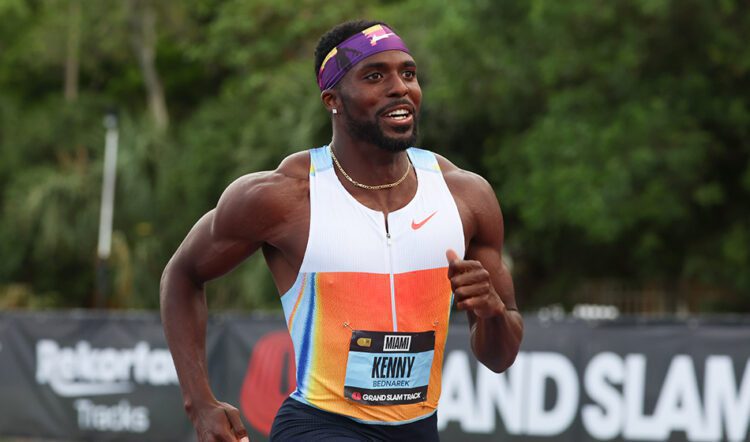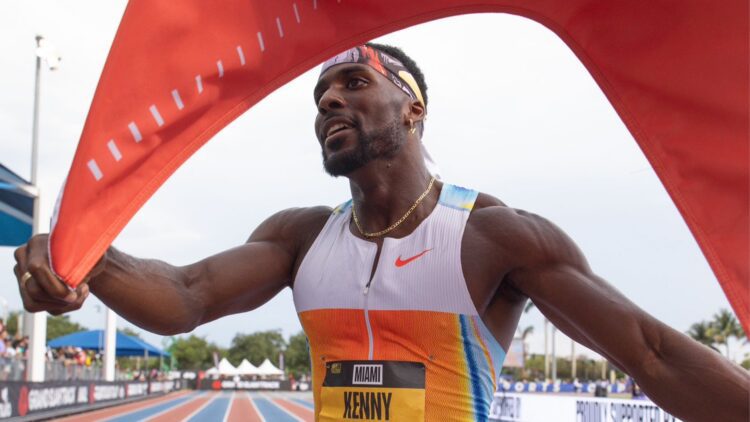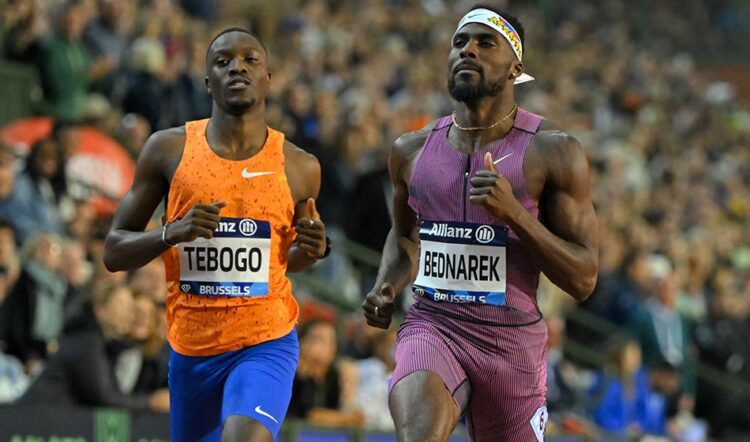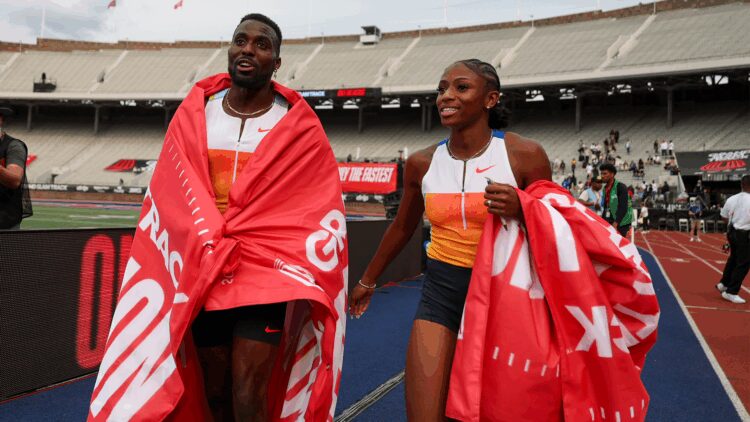Kenny Bednarek's love of martial arts is improving his ability to relax in the quest for a major sprints gold
It has become a well-worn routine that signals when it’s time to get to work. “I do the same thing every single time I go to the track,” says Kenny Bednarek. “I put the headband on, do my bow and make sure to get my mind right.”
Those rituals herald the arrival of “Kung Fu Kenny”, not so much an alter ego as a state of mind for the two-time Olympic 200m silver medallist – a man who has been doing his level best to make a serious dent in the sprinting world but perhaps hasn’t been lauded in quite the same way as some of his peers.
Bednarek, by his own admission, is: “Not really an attention grabber or seeker, so I kind of fly under the radar.” On one hand, the American is happy with that state of affairs, to do his own thing and just get on with the task at hand but, on the other, he is also still searching for greater professional contentment.
“I feel like, when I step on the track, people know who I am and they know what I'm going to do, so that respect is there, but I still do have a chip on my shoulder,” says the 2022 World Championships 200m silver medallist. “I'm trying to be the best and one of my big motivations is to do my thing and get these gold medals, but that's what I've been short of in the past few years. I've always been, I guess, Mr Silver and that's something that I want to change. I want to be the best and getting second place every single time is not being the best.”

With that in mind, the 26-year-old has spent 2024 getting into the winning habit. At the time of writing, the Philadelphia leg of this year’s Grand Slam Track was yet to unfold but, even before the third chapter of Michael Johnson’s new athletics drama, Bednarek had already emerged as a leading man.
In Kingston, he won both the 100m and 200m before repeating the trick in Miami. He has also helped the USA 4x100m team secure their spot at this summer’s World Championships, part of the line-up that took them to silver behind South Africa at the World Relays in Guangzhou.
That he has been a force to be reckoned with over 200m is hardly a surprise, but the big difference so far in 2025 has been his prowess over the shorter distance. At his Florida training base where he is coached by Dennis Mitchell, he has been hard at work. And it shows.
“I had a lot of momentum built up coming off of the end of last year, so this year I just wanted to come out, make a statement, be dominant and really focus on my weaknesses,” says Bednarek, who first came to prominence over the 200m and 400m.
“That’s what I did during the off-season and I came out with a bang. I'm having a lot more fun this year and one of the things I've been focusing on the most in the 100m is my start. In previous years, I would always run pretty good 100m times but I would do it running behind people and catching them so the goal this year was to get a good enough start to where I'm with them, and if I'm with them, my top end speed is going to take over towards the tail end of the race and nobody's going to catch me.
“That's what’s been happening and, once I started hitting that, building that, gaining that confidence and seeing the results… my confidence has gone through the roof. And the fact that we're actually having fun with it as well…that's why I say I'm dangerous. If I'm having fun and I'm healthy, I don't think anybody can stop me.”

It helps that Bednarek is surrounded by fierce competition in Mitchell’s group, which also contains the likes of world 100m champion Sha’Carri Richardson and former world 100m champion Christian Coleman, a renowned fast starter, who has been a big influence
“The thing that helped my start was the mentality,” says Bednarek. “Being a 400m/200m guy coming into the pro scene, I didn't really have a phenomenal start. Going into the group I am in now, my mentality was kind of like: ‘Oh, they're good starters. Let's try to mitigate how much they get ahead of me’.
“This year, I came in with the mindset that I'm a good starter as well. I made the [Olympic] 100m final [finishing seventh], so there's no excuse for me not to be up there with them. And, with that mentality change, I guess I just woke up one day and started applying more pressure in the beginning.
“Once I started to see that I was with everybody at 30 to 40 metres, I knew that everything was going to be alright. The addition of Christian Coleman has helped as well, because it's one thing when you see somebody like that every now and then at a race but now I train with this guy every single day, so I know exactly where I am. He helps a lot of us focus on our weaknesses.
“There's so much talent and it's very intense. You know every single rep is going to be top notch and, [to make sure you don’t get] your butt kicked in a certain rep, you’ve got to make sure to focus on what your coach is telling you to focus on.”

For Bednarek, that focus is on one short word. Relax. It’s the paradox of sprinting that an athlete is trying to generate as much force, speed and power as possible while at the same time trying not to chase after it too much. It was the creep of tension and his attempts to force the issue, says Bednarek, that stopped him from taking 200m gold in Paris. He is accustomed to coming off the bend out in front. It is the latter stages of the race that have proved problematic.
“Coming off the bend, everything was good, and then once we got towards that 120m mark, I tightened up a little bit,” he says, thinking back to that final in the Stade de France where Letsile Tebogo emerged victorious. “I know I'm always going to get off the bend and the difference between me winning and losing is what I do in the last 70 to 80 metres. If I stay relaxed and keep applying pressure, then nobody's going to beat me.
“But, in previous years, something that I had a hard time focusing on was just staying relaxed. As soon as you start seeing a hand or a foot or something like that [out of the corner of your eye], you want to push that red button and be like: ‘Okay, we’ve got to put on the turbo boost’. But you’ve already set up your rhythm during the race, and it's hard for your body to react that way so everything tightens up and, in return, you're going to run slower.

“Going to the other races after that, one thing that I was just focusing on was staying relaxed. When I went to [the Diamond League meetings in] Zurich and then Brussels, those were my best races.
“I ended up executing the race that I needed to execute, stayed relaxed and I got the win [in Brussels]. That gave me a confidence boost going into the next year, and that's why we're getting the results that we're seeing now, because I feel like I perfected staying relaxed, being myself and executing my race.”
Bednarek has a number of important people in his life. There’s his twin brother Ian, his mother Mary who adopted them both from foster care, his adopted siblings, his girlfriend (Indian professional golfer Sharmila Nicollet) and his coach, Mitchell.
There’s also another character, albeit fictional, who has been key to his story – and the creation of Kung Fu Kenny. Naruto Uzumaki is central to a Japanese manga comic book series and follows the story of a young ninja with ambitions of becoming the leader of his village. It was seeing the animated version of it, in the anime style, on TV that grabbed a young Bednarek’s attention.
“I started watching that when I was a kid, I think when I was seven or eight,” he says. “My sister was a big anime fan, I started watching with her and ended up loving it. One storyline in particular, Naruto, is about a kid that is shunned from his village just because he has something different about him.
“But that doesn’t make him want to roll over and give up on his dreams. No matter what people said about him, he just said: ‘Screw all that. I want to be the top dog. I want to be the village leader, so I'm just going to keep focusing on myself and be the best that I can be’.
“The fighting scenes are awesome, but it's more the storyline that I love. A lot of people can relate to those characters because they could be in a similar situation [themselves] and they get motivation from watching a fictional character and applying it to real life.”

Bednarek did just that and the arrival of Kung Fu Kenny four years ago has helped him to write his sporting narrative, though it’s not just some throwaway nickname. There is a depth of meaning to the moniker.
“I wanted to come up with a persona that pertains to me,” he explains. “I like anime, I like Kung Fu and all that scene. I wear my headband all the time so we came up with Kung Fu Kenny, because Kung Fu has a set of values – humility, discipline, respect and dedication. I try to live those values on and off the track. That's who I am. Now, once I get on the track, you get the bow, the headband and the stoic face, and then it's ready to go. If I don't have my headband, I feel naked.”
Along with Akani Simbine, Bednarek is one of the most in-form of the big-name sprinters of 2025 so far. While some are taking their time to emerge from winter hibernation, given the September start of the Tokyo World Championships, others are taking a while to shake off the early-season rustiness, while the likes of defending 100m and 200m champion Noah Lyles has been hampered by injury. Bednarek knows it won’t take long for that picture to change, though, and is preparing to expect the unexpected.
“Every year it just seems like there's always going to be somebody new that comes on the scene and I think that's very exciting,” he says. “You don't know who's going to pop up next.
“I love competition, so seeing other athletes pop up gets me excited, because that means I have to get better but this year is definitely going to be interesting. We have a very long season, and everybody's going to make sure to peak at the right time but, right now, I'm in a good spot. If I stay relaxed, I'm going to be fine.”
